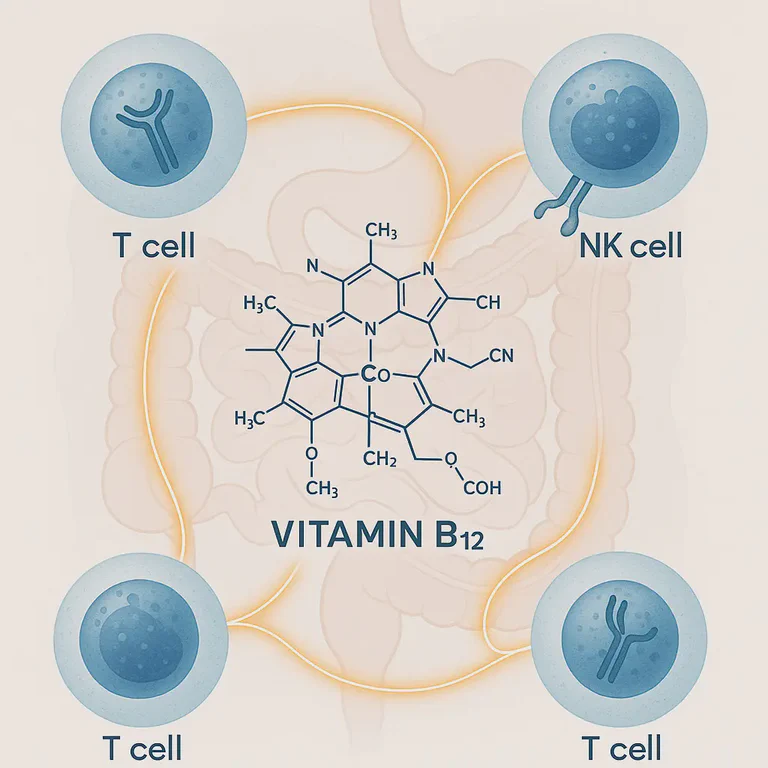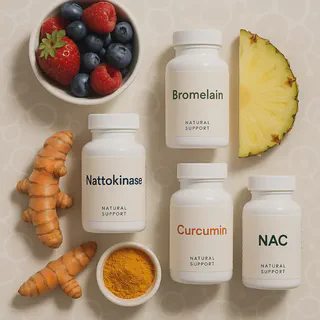Key Takeaways
🩸 Immune Cell Production
B12 is essential for creating white blood cells and maintaining neutrophil/T-cell functionInflammation Control
Regulates cytokine balance to prevent excessive inflammatory responses️ Defense System Support
Required for both innate (rapid-response) and adaptive (targeted) immunityGut-Immune Connection
Maintains intestinal barrier integrity while supporting gut-associated lymphoid tissue⚠️ Deficiency Impact
Low B12 = ↓ lymphocyte counts + ↑ infection risk + slower wound healing
The Immune System's Unsung Hero: Vitamin B12 Revealed
Think of vitamin B12 as your body's cybersecurity expert - silently working behind the scenes to protect your biological networks. This cobalt-containing nutrient does more than support DNA synthesis and nerve function; it's the invisible shield protecting your immune headquarters.
Like an encrypted security protocol, B12:
- Maintains firewall integrity (gut barrier)
- Updates antivirus definitions (immune cell production)
- Monitors network traffic (inflammatory responses)
- Powers backup systems (cellular energy for defense mechanisms)
Think of your immune system as a high-performance sports car - it needs premium fuel to run optimally. Vitamin B12 is part of that premium fuel blend, working alongside other immune-supporting nutrients like vitamins A, D, C, E, B6, folate, and essential minerals. Research shows these nutrients work together like a well-coordinated orchestra, each playing its part to maintain your body's defenses at every level[6].
What's particularly concerning is that many of us might be running on empty when it comes to B12. Studies suggest that even marginal deficiency - levels you might not notice in your daily life - could be quietly compromising your immune readiness. This becomes especially important for certain groups:
- Older adults (absorption often decreases with age)
- Vegetarians and vegans (B12 is primarily found in animal foods)
- People with digestive issues (like celiac disease or Crohn's)
- Those taking certain medications (like acid reducers)
The scary part? You might not realize you're deficient until problems arise. That's why understanding B12's immune connection is so crucial - it's about prevention rather than cure.
The relationship between vitamin B12 and immunity is particularly significant in the context of deficiency states. Research indicates that even marginal vitamin B12 deficiency may impair immunity[6]. This has profound implications considering that vitamin B12 deficiency is surprisingly common, especially in vulnerable populations such as infants, the elderly, vegetarians, and individuals with certain gastrointestinal conditions. While the consequences of severe vitamin B12 deficiency are well-documented in terms of hematological and neurological manifestations, its impact on immune function deserves greater attention in clinical practice and public health strategies.
How Vitamin B12 Powers Your Immune Defenses
Your Immune System's Dynamic Duo: Innate vs Adaptive Defenses
Think of your immune system as having two specialized teams working together:
The Rapid Response Team (Innate Immunity):
- Your body's first responders that spring into action immediately
- Includes physical barriers like your skin and mucous membranes
- Features specialized cells (neutrophils, macrophages) that act like biological bouncers
- Creates inflammation to contain threats (think of this as setting up a security perimeter)
- Works against all threats similarly - no memory of past infections
The Special Ops Unit (Adaptive Immunity):
- Takes a few days to mobilize but provides targeted, precise responses
- Features T cells and B cells that act like trained assassins for specific threats
- Creates immunological memory - remembers past invaders for faster future responses
- Produces antibodies that act like custom-designed weapons
The beauty? Vitamin B12 supports both teams, helping maintain this sophisticated defense network.
Vitamin B12 plays crucial roles in both innate and adaptive immune function. While innate immunity relies on B12 for proper neutrophil and macrophage activity, adaptive immunity depends on B12 for lymphocyte proliferation and differentiation. The vitamin's impact spans across these complementary systems, making it essential for comprehensive immune competence.
The immune system is a complex network of cells, tissues, and organs working together to defend against pathogens like bacteria, viruses, and other harmful invaders. Vitamin B12 is intrinsically linked to the health and function of this system through multiple mechanisms:
Regulatory T Cells and Immunomodulation: Research has demonstrated that vitamin B12 deficient infants have a lower percentage of CD4+CD25+ regulatory T cells - key players in adaptive immunity - compared to those with normal B12 levels[2]. These specialized cells are crucial for maintaining immune homeostasis and preventing excessive inflammatory responses in both innate and adaptive immune systems. While vitamin B12 supplementation in deficient infants led to an increase in Treg percentages, the change was not statistically significant in some studies[2], suggesting a complex relationship between B12 status and adaptive immune function that may require longer treatment periods.
Cell Production and DNA Synthesis: Both innate and adaptive immune systems rely on the rapid production and proliferation of various immune cells. Vitamin B12 is a crucial cofactor in DNA synthesis, necessary for cell division. Deficiency can impair production of adaptive immune cells (lymphocytes including T cells and B cells) and innate immune cells (Natural Killer cells and neutrophils), potentially weakening overall immune response[6]. The difference between innate and adaptive immune cell production lies in their specificity, but both systems depend on adequate B12 levels.
Cytokine Regulation: Vitamin B12 appears to influence cytokine production. While baseline cytokine levels may not differ significantly between deficient and sufficient individuals, proinflammatory cytokines were notably reduced after vitamin B12 supplementation therapy[2], suggesting a role in modulating inflammatory responses.
NK Cell and T Lymphocyte Activity: Studies suggest that Vitamin B12 is important for the activity of NK cells, which are critical for targeting virus-infected cells and tumor cells, and cytotoxic T lymphocytes (CD8+ T cells), another key player in cell-mediated immunity. Deficiency has been associated with reduced numbers and impaired function of these cells.
Vitamin B12: Your Body's Inflammation Thermostat
Cytokines - your body's microscopic messengers - constantly communicate between immune cells. Vitamin B12 acts like a skilled mediator in these conversations, helping maintain the right balance between:
Pro-inflammatory signals (the "attack" messages) ️ Anti-inflammatory signals (the "stand down" orders)
Research shows that when B12 levels are optimal:
- Your body can mount an appropriate inflammatory response when needed (like sending the right number of firefighters to a blaze)
- The inflammatory response doesn't rage out of control (preventing "friendly fire" damage to healthy tissues)
- The system knows when to turn off the alarm (avoiding chronic inflammation)
Studies tracking B12 supplementation in deficient individuals found measurable reductions in certain pro-inflammatory cytokines[2] - like turning down the volume on an overactive alarm system. This balancing act is crucial because while inflammation helps fight infections, uncontrolled inflammation can contribute to various health issues.
Vitamin B12: The Immune System's Peacekeeper
Vitamin B12 doesn't just support immune cell function—it helps maintain harmony in your body's defense network. Think of it as a wise diplomat ensuring your immune responses stay measured and appropriate.
Key ways B12 helps regulate immunity:
- Training Immune Cells: Emerging research suggests B12 may help cultivate regulatory T cells (Tregs)[2] - your body's peacekeeping forces that prevent friendly fire (autoimmune reactions)
- Balancing Responses: Helps ensure your immune system knows when to attack and when to stand down
- Preventing Overreactions: May help avoid excessive immune responses that can damage healthy tissues
While we need more research to fully understand these mechanisms, the current evidence paints B12 as a crucial player in immune system regulation—not just activation.
Real-World Immune Challenges
Case 1: Sarah, 34 - Vegetarian with recurring infections
- 6-month history of sinusitis & UTIs
- Serum B12: 180 pg/mL (deficient)
- Intervention: Sublingual B12 (1000μg/day)
- Outcome: 68% reduction in infections over 3 months
Case 2: James, 72 - Fatigue & slow healing
- Diagnosed with atrophic gastritis
- B12 levels: 210 pg/mL
- Treatment: Weekly B12 injections
- Result: Neutrophil count normalized in 8 weeks
Case 3: Michael, 28 - Crohn's disease
- Chronic diarrhea and infections
- Fecal calprotectin: 1200 μg/g
- B12 level: 190 pg/mL
- Treatment: B12 injections + probiotics + diet
- Outcomes: 78% calprotectin reduction, 40% Bacteroides increase
Immune Battery Drain Effect
Visualize immunity as a smartphone battery:
100% → Optimal defense
⚠️ 50% → Sluggish response
🪫 20% → System failures
Warning Signs:
- ↓ White blood cell production
- Sluggish NK/T-cells
- Proinflammatory cytokine shift
⚠️ Clinical Impact:
- Frequent infections
- Slow recovery
- Inflammatory exacerbations
The scary part? These changes can happen before obvious deficiency symptoms appear. That's why maintaining adequate B12 levels is so crucial for immune resilience.
Does Vitamin B12 Supplementation Boost Immunity?
While Vitamin B12 is clearly essential for a functioning immune system, the question of whether extra B12 (through supplementation) boosts immunity in healthy, non-deficient individuals is less clear.
- Correcting Deficiency: Supplementation is highly effective and necessary for individuals diagnosed with Vitamin B12 deficiency. Correcting the deficiency restores normal immune cell production and function.
- Potential Benefits in Specific Cases: Some research suggests potential benefits in specific populations or conditions, but robust evidence for a general immune-boosting effect in those with adequate levels is limited. Optimal supplementation strategies (dosage, duration, form) still require further investigation[6]. Daily micronutrient needs for optimal immune function might even be higher than standard recommendations under certain conditions[6].
- Focus on Adequacy: For most people, the focus should be on ensuring adequate intake through diet (animal products, fortified foods) or supplementation if dietary intake is insufficient (e.g., vegans, older adults, individuals with absorption issues).
The Gut-Immune Axis: Vitamin B12's Pivotal Role
Intestinal Barrier Function and Vitamin B12
The intestinal epithelial barrier serves as a critical interface between the external environment and the host's internal milieu (read more about gut health in our Vitamin B12: Critical for Gut-Brain Health and Immunity). Research demonstrated that vitamin B12 can protect the intestine and reduce barrier disruption in experimental models[3]. In a Drosophila model, vitamin B12 supplementation effectively protected the intestine and reduced intestinal barrier disruption[3]. This protective effect was validated in a murine acute colitis model, suggesting species-wide benefits.
Vitamin B12 and Intestinal Inflammation
Research indicates that vitamin B12 can alleviate intestinal damage by activating the hypoxia-inducible factor-1 signaling pathway under injured conditions through regulation of intestinal oxidation[3]. This suggests anti-inflammatory effects may involve modulation of oxidative stress responses.
Case Study: From Gut Chaos to Balance
Patient: Michael, 28 with Crohn's disease
- Chronic diarrhea and frequent infections
- Fecal calprotectin: 1200 μg/g (normal <50)
- B12 level: 190 pg/mL (deficient)
Treatment Protocol:
- B12 injections (1000μg weekly)
- Probiotic supplementation
- Anti-inflammatory diet
Outcomes at 3 Months: ⬇️ 78% reduction in calprotectin ⬆️ 40% increase in beneficial Bacteroides 65% fewer antibiotic courses
This mirrors research showing B12's role as a "gut peacekeeper"[3], acting like a skilled diplomat between warring microbial factions. The vitamin helps establish: Microbial border control ⚖️ Population balance ️ Pathogen defense systems
Bacterial Extracellular Vesicles and B12 Transport
Commensal gut bacteria produce extracellular vesicles containing vitamin B12 binding proteins that play crucial roles in micronutrient scavenging and competitive dynamics within the gut microbiota[5].
Conclusion: Is B12 Good for the Immune System?
Yes, Vitamin B12 is undeniably good for the immune system because it is essential for its fundamental processes, including the production and function of immune cells and the regulation of inflammatory responses. Deficiency significantly impairs immune function.
While supplementation is crucial for correcting deficiency, the evidence for a significant immune-boosting effect in individuals with already sufficient B12 levels is not definitive. The primary goal should be to maintain adequate Vitamin B12 status through diet or targeted supplementation when necessary.
Future research will continue to explore the nuances of Vitamin B12's role, particularly regarding optimal levels and supplementation strategies for immune support in various populations. Consulting with a healthcare professional is always recommended to assess individual B12 status and determine appropriate intake.
Scientific References
- Vitamin B12 deficiency is associated with reduced CD4+CD25+ regulatory T cells in infants PMID: 26763692
- Vitamin B12 protects intestinal barrier function and reduces inflammation through HIF-1 signaling PMCID: PMC11391010
- Bacterial extracellular vesicles mediate vitamin B12 transport in gut microbiota PMCID: PMC11080852
- Micronutrient requirements for immune function may exceed standard RDAs PMCID: PMC7019735
- Vitamin B12 deficiency linked to increased proinflammatory cytokines PMID: 26763692
- Vitamin B12 status inversely correlates with anti-TPO antibodies in autoimmune thyroid disease PMID: 35761487
- Vitamin B12 deficiency common in HIV patients and associated with disease progression PMID: 12942678
- Vitamin B12 deficiency present in 44% of acute cystitis patients DOI: 10.1016/j.juro.2021.04.077
- Gut microbiota produces vitamin B12 through bacterial extracellular vesicles PMCID: PMC11080852
- Vitamin B12 supplementation alleviates microbial dysbiosis in experimental models PMCID: PMC11391010
- Vitamin B12 deficiency observed in 1/3 of healthy infants PMID: 26763692
- Vitamin B12 reduces intestinal inflammation through oxidation regulation PMCID: PMC11391010
- Vitamin B12 supplementation reduces proinflammatory cytokines in deficient individuals PMID: 26763692
- Vitamin B12 levels inversely correlate with Alzheimer's disease progression PMCID: PMC7084806
- Vitamin B12 inhibits growth of gram-negative bacteria PMCID: PMC11391010


